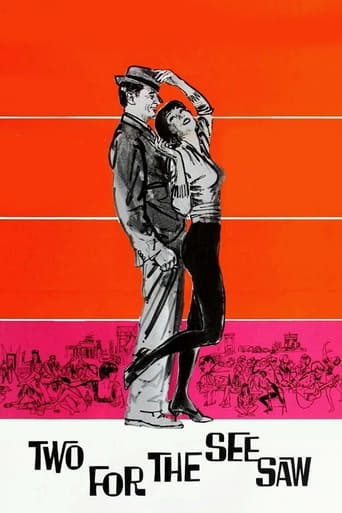

The greatest movie ever made..!
... View MoreSadly Over-hyped
... View MorePlot so thin, it passes unnoticed.
... View MoreIt's fun, it's light, [but] it has a hard time when its tries to get heavy.
... View MoreAside from the occasionally ridiculous dialogue, the claustrophobic sets, and Mitchum's stone face, this is a very pretty B/W experience. The Dance sequence is especially nice. Unfortunately, the male/female dynamic is horribly dated. This was intended to be the meeting of 50s conservatism with 60s licentiousness. And although that dynamic still exists in our society, the attitudes that drove these characters are long gone.The bare story is about two people who need to have other people depend on them. The power in the relationship shifts back and forth between the two characters, never actually being equal. This is an interesting idea, and there are some interesting passages. The script is peppered with some nice exchanges and some really weird "huh?" moments. However, as is most important for a closed-room movie of this type, the two leads don't really have much chemistry. You never get the sense that they believe the words they're speaking.
... View MoreRecently got a chance to see this movie and thought the performances by Robert Mitchum and Shirley MacLaine were great. Especially like the part that Shirley MacLaine played. I am not to used to seeing Robert Mitchum in roles like this but thought he did well. He plays a man going through a divorce who meets a younger woman played by Shirley Maclaine. Having both different life experiences they somehow try to make their new relationship work. I gave this film an 8 out 10 and was pleasantly surprised to find that it was this good. Read in another post that at the time of this films release critics didn't think that Mitchum's role was believable enough because of perhaps the age difference. I had no problem with buying into this story and the actors that portrayed the characters. Good Movie!
... View MoreThis movie is very intelligent, sensitive, and appealing. The ending is honest and touching. So why does this movie feel so unsatisfactory? A big problem is the casting. The actors do not comfortably inhabit their roles. Although trying very hard, Shirley MacLaine gives us the impression of someone trying hard to be Jewish rather than someone who is, even with the set designer's help of a menorah on her mantelpiece. A Jew leading such a secular, not to mention sexually free, life is hardly likely to prominently display a Jewish symbol that Jews normally display only once a year, on the holiday for which it is used.But the character is also odd. Gittel says that if Jerry ever met her mother he would take off. That is the only reference to her family. From her accent and intonations she is plainly a lower-middle-class Jew from a background that is moral and conservative but crude, without education and culture. How and why did she get to be the way she is? Why does she think so little of herself that she thinks she has to sacrifice her self-respect and happiness to everyone else's? Mitchum is even stranger. He lopes into the movie like the lone gunfighter off the prairie, not like the lonely sad sack he is supposed to be. His charisma and intense sexuality are held in check, but he is still a much more attractive and self-possessed man than the part calls for. Also, he is much too old. Jerry need only be about five years older than Gittel, but Mitchum is old enough to be her father and, since she looks younger than her age, could almost be her grandfather. It makes you wonder why it has taken him so long to work out that he is so unhappy he wants to leave his wife. Also, it does not seem believable that he could stay even five minutes at the beatnik party without the women hitting on him. He never shows the vulnerable, lost quality that Jerry should have--you never believe he can't take care of himself and any trouble that comes along.At the time the film was made, it could just about get away without asking these questions, but now we are more skeptical and curious. Time has also exposed the inherent (though very well disguised) male chauvinism of the material. William Gibson's other successful play was The Miracle Worker. This one, though the characters are very different, has the same story, only this time both characters are working a miracle on each other--teaching each other self-knowledge and self-respect. But Jerry comes out with a lot more than Gittel. All she has is the self-respect (possibly--one suspects that she will slump back into her aimless, masochistic life). He has the loving wife and the nice house and the job and the stable community. In the end, this is a male fantasy--the man with the troubled marriage has a lot of sex with a pretty, much younger woman, who gives him the knowledge and the courage to go back to the life where he belongs. But what about the sex therapist? She LOSES the man she loves, and yet ends up thanking him for betraying her! (It's not likely that Jerry and Gittel, so very different, and he in a city where he feels uncomfortable, would have lasted very long together, but that's a separate issue.) Though Jerry is supposed to be curing Gittel of being, emotionally, the cobbler who has no shoes, he is the one who takes the most from her and then leaves. Her final speech that the next man she meets is going to have a lot to be grateful to him for sounds painful and phony, as if she is, once again, trying to make him feel better rather than caring for her own feelings.
... View MoreThe post-beatnik / pre-hippie party scene is truly spectacular as a snapshot of a time/place rarely caught on film. While most of America was still living a black & white Eisenhower existence, this film shows the cutting edge NYC scene that had already moved beyond bebop and Kerouac and was just about to stumble full tilt into the Warhol Factory. The party scene probably seemed about as weird to middle America as the alien bar scene in Star Wars, fifteen years later. But one kid in every high school across the country changed their plans to attend 'State' and filled out last minute applications to NYU; they knew that they would grow old waiting for that world to reach their hometown.A little known treat for anyone into the early days of "alt".
... View More